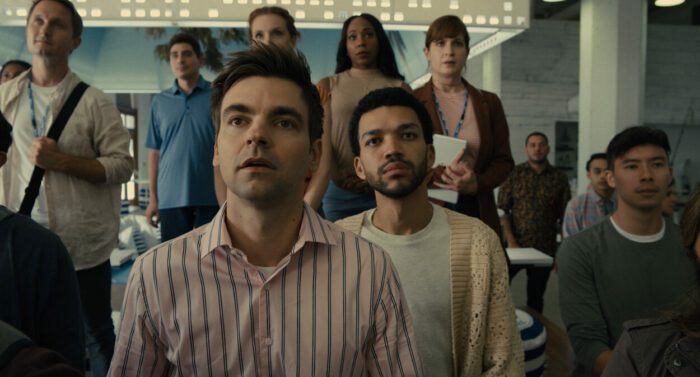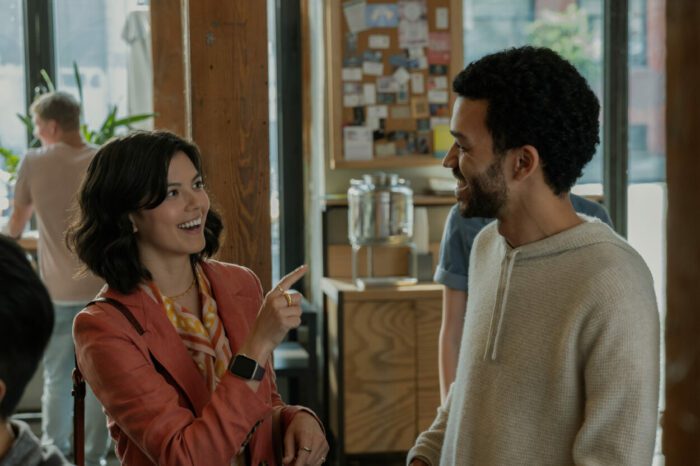I was enticed by the trailer and enthralled by the premise of The American Society of Magical Negroes—a satire of the “Magical Negro” trope. I walked out of the theatre thinking I had a good time; I then logged into Letterboxd, X (Twitter), Rotten Tomatoes, and IMDb just to find out I am singular.
It occurred to me that perhaps, as a white woman, I found The American Society of Magical Negroes an entertaining satire in its own way precisely for the reasons other critics are calling it shallow. One-dimensional Black characters are palatable for my whiteness. I’m a fan of fantasy and the dark academia aesthetic that this film plays into. I am a fan of every actor cast: Justice Smith, David Alan Grier, Nicole Byer, An-Li Bogan, Michaela Watkins, and Drew Tarver.
Thinking back on The American Society of Magical Negroes, I suppose it is true that we don’t know much about each character at all. The film is less character- than plot-driven. Justice Smith plays Aren, the main character, who is a failed artist who cannot stick up for his work, himself, and his race. He’s pulled into the society by David Alan Grier, who plays Rogar, a more senior member of the society who trains Aren to be a “Magical Negro”. Aren is thrown into the lion’s den of a stereotypical tech start-up where he is to help the life of Jason (Drew Tarver)—a white man failing up the corporate ladder.

In the same office is Lizzie (An-Li Bogan), who, unfortunately, Aren and Jason both fall for. Roger has to encourage Aren to shove aside his feelings for Lizzie because the “client” always comes first. It also comes to light that the tech company they all work for is wrapped in a racism scandal with their newest face recognition software. Aren’s first assignment as a member of The American Society of Magical Negroes is a mess; his client Jason is climbing the ladder despite his involvement in racist software and his desire to have Lizzie too. He wants both things; he gets both things. Aren is faced with a choice: continue putting Jason’s feelings before his own or make himself heard—sharing what makes him uncomfortable, hurt, and angry.
I found the story easy to follow, and watching Justice Smith develop emotional boundaries was enjoyable. He’s a great actor. However, it’s true that there is still so much we don’t know or understand about Aren. We don’t meet friends or family, people from his life prior to joining The American Society of Magical Negroes. What we know about Aren is that he’s a pushover, makes yarn sculptures, and went to a prestigious art school. Really, that’s not much.
We don’t know much about Roger (David Alan Grier), either, besides that he’s good at his job. He once fell in love with the fiancée of one of his clients and always puts his client first. We certainly don’t know much about any of the other members of The American Society of Magical Negroes. Especially Nicole Byer, who plays the president of the society, Dede, whose comedic talents are also underutilized.

I think the story was safe for satire. It pokes fun at things we already know are flimsy stereotypes. Michaela Watkins plays a boomer white woman who throws Lizzie (An-Li Bogan) under the bus in favour of Jason (Drew Tarver) because she thinks his participation will make her more likely to get promoted. This shows exactly the kind of white feminism that leftists and the media have been critiquing and putting on blast for years. That’s safe. Rupert Friend plays the “genius” who started the tech company, and he’s the typical picture of a multimillionaire with zero empathy. That’s safe; it’s been done.
For sure, I think that The American Society of Magical Negroes plays into satire and critiques which have already been played out. I also see how the Black characters meant to be liberated through satire are still being shafted into one-dimensional roles. An-Li Bogan’s Lizzie was also barely developed, which is a shame as her characterization could have had some very sharp critiques about Asian women in corporate settings or being pursued by white men.
At the end of the film, what I felt most about The American Society of Magical Negroes was the essence of a rom-com. We get a happy couple and a hopeful future. Little time is given to the client in the film’s final minutes, which centres the Black main character and Asian romantic interest in the conclusion, which in turn emphasizes their story as the central story—not once does it feel like the white characters are taking over the plot.
At best, The American Society of Magical Negroes is an enjoyable, light watch. There is certainly still room for the “Magical Negro” trope to be further critiqued and satirized in other ways; however, I cannot damn the film for being bad because it isn’t. I think The American Society of Magical Negroes may serve best as a primer, an opening argument leaving plenty of room for more projects to expand upon the satire it aspires to be.



